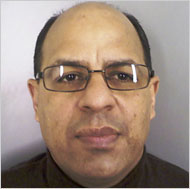| @wehaitians.com | |
No one writes to the tyrants | |
HistoryHeads/Not Just Fade Away |
| Correspond with us, including our executive editor, professor Yves A. Isidor, via electronic mail: |
| letters@wehaitians.com; by way of a telephone: 617-852-7672. |
| Want to send this page or a link to a friend? Click on mail at the top of this window. |
|
 |
|
Posted Wednesday, December 31, 2008
$2 Million Bail for Man Accused of Defrauding Fellow Churchgoers
By BENJAMIN WEISER
A man accused of orchestrating a Ponzi scheme that lost fellow worshipers at a church in Upper Manhattan more than $600,000 was granted $2 million bail on Tuesday despite the objections of prosecutors who voiced concern that he might flee the country.|
|
|
 |
|
| UNITED STATES POSTAL INSPECTION SERVICE | |
| Prosecutor argued Bryant Rodriguez was a flight risk. | |
|
|
| Wehaitians.com, the scholarly journal of democracy and human rights |
| More from wehaitians.com |